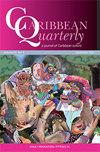Does Fidel Eat More than Your Father?
Q3 Arts and Humanities
引用次数: 0
Abstract
BARRY RECKORD, A YOUNG JAMAICAN GRADUATE OF Cambridge University, emerged in the 1960s as Britain’s leading, indeed, first successful black playwright. He was a man with a great love of humanity, acutely aware of its material suffering and spiritual depravity having witnessed the extremes of privilege and poverty growing up in Jamaica in the 1940s. His compassion was such that he considered studying for the priesthood. But spiritual caring had to be coupled with purposive action to address the material circumstances of poverty which engulfed so many, particularly in the developing world of which he was a product. An education at one of the world’s leading universities was not just a privilege but an enabling capacity to respond to the émigré’s guilt of not being present to engage first-hand in the struggle of decolonisation and nationbuilding. This gnawed at his conscience as he looked out over Primrose Hill, London from his perch in his second-storey flat. The condition of mankind, especially in his native Caribbean, spurred his restless intellect and increasingly demanded time from playwriting. Starting in the mid-1950s and continuing into the 1960s, his plays were staged at the Royal Court and the Arts Theatre in London’s West End, and on Granada and BBC television. The concern for poverty was evident in one of his early successes, Skyvers,1 which explored the listlessness of impoverished British school-age teenagers, undoubtedly reflecting his experience as a high school teacher in England. The hallmark of this intellect was his brutal honesty, emblematic of which was asking the uncomfortable question which sought not the what but the why and more so the why not. He was naturally curious about the many new FLASHBACK菲德尔比你父亲吃得多吗?
来自剑桥大学的年轻牙买加毕业生巴里·雷科德在20世纪60年代成为英国第一位成功的黑人剧作家。他是一个热爱人类的人,敏锐地意识到人类的物质苦难和精神堕落,见证了20世纪40年代在牙买加长大的特权和贫困的极端。他的同情心如此之深,以至于他考虑学习当牧师。但是,精神关怀必须与有目的的行动相结合,以解决贫困的物质环境,贫困吞噬了许多人,特别是在他所处的发展中国家。在世界领先的大学之一接受教育不仅是一种特权,也是一种应对移民没有亲自参与非殖民化和国家建设斗争的内疚感的能力。当他坐在二层公寓里俯瞰伦敦的Primrose Hill时,这让他的良心备受煎熬。人类的状况,尤其是在他的祖国加勒比海,激发了他不安的智力,并越来越需要时间来创作剧本。从20世纪50年代中期开始,一直持续到20世纪60年代,他的戏剧在伦敦西区的皇家宫廷和艺术剧院以及格拉纳达和英国广播公司的电视台上演。对贫困的担忧在他早期的成功作品之一《Skyvers》中表现得很明显,该书探讨了贫困的英国学龄青少年的无精打采,无疑反映了他在英国担任高中教师的经历。这种智慧的标志是他残酷的诚实,象征着他提出了一个令人不安的问题,这个问题不是为了什么,而是为了为什么,更重要的是为什么不。他自然对许多新的FLASHBACK感到好奇
本文章由计算机程序翻译,如有差异,请以英文原文为准。
求助全文
约1分钟内获得全文
求助全文

 求助内容:
求助内容: 应助结果提醒方式:
应助结果提醒方式:


